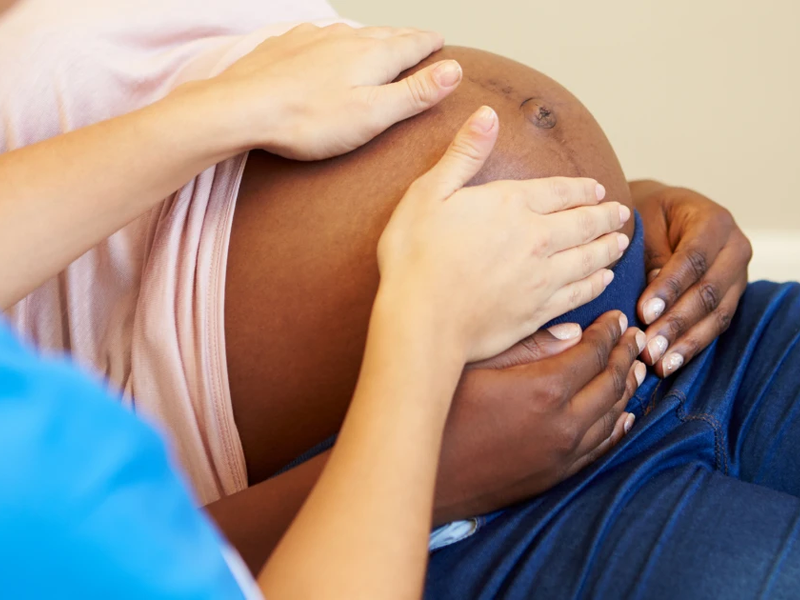The maternal mortality rate for Black women has increased over the years with a spotlight on the lack of medical support given to them by medical professionals. High-profile deaths like that of the late Kira Johnson and the delayed response medical professionals gave superstar athlete Serena Williams have pushed the injustices to the forefront. More women are turning to doulas for their experience and knowledge to give suggestions for positions that are more comfortable and give hands-on comfort during labor, providing continuous physical and emotional support before, during, and after birth.
In 2017 stars of the reality TV show Love & Hip Hop-New York, rappers Remy Ma and Papoose, shared their excitement that they were having a baby. Sadly, they soon realized Remy’s pregnancy was ectopic and she had to terminate her pregnancy with an emergency surgery. In addition, her doctor told her that she will probably never be able to give birth again but thankfully that wasn’t the case and the following year they were blessed with a baby girl, Reminisce Mackenzie Mackie.
Ectopic pregnancies have also become a point of discussion after the Supreme Court overturned Roe v. Wade, since there’s confusion around whether the treatment of ectopic pregnancies could be considered an abortion, and thus may be restricted, depending on a state’s particular abortion laws. Here’s everything you need to know about ectopic pregnancies and how common they are in Black women.
Ectopic pregnancy is when a pregnancy grows outside of your uterus, usually in your fallopian tube. This can lead to life-threatening complications. An ectopic pregnancy can be fatal for the pregnant person without prompt intervention. The fallopian tube, for example, may burst, leading to shock and serious blood loss. Swift treatment is crucial. It cannot, however, preserve the embryo.
Ectopic pregnancy is a potentially life-threatening condition occurring in 1-2 % of all pregnancies. The most common ectopic implantation site is the fallopian tube, though 10 % of ectopic pregnancies implant in the cervix, ovary, myometrium, interstitial portion of the fallopian tube, abdominal cavity or within a cesarean section scar.
What causes an ectopic pregnancy?
The cause of an ectopic pregnancy isn’t always clear. In some cases, the following conditions have been linked with an ectopic pregnancy:
- inflammation and scarring of the fallopian tubes from a previous medical condition, infection, or surgery
- hormonal factors
- genetic abnormalities
- birth defects
- medical conditions that affect the shape and condition of the fallopian tubes and reproductive organs
All sexually active women are at some risk for an ectopic pregnancy. The risk factors increase with any of the following:
- maternal age of 35 years or older
- history of pelvic surgery, abdominal surgery, or multiple abortions
- history of pelvic inflammatory disease (PID)
- history of endometriosis
- conception occurred despite tubal ligation or intrauterine device (IUD)
- conception aided by fertility drugs or procedures
- smoking
- history of ectopic pregnancy
- history of sexually transmitted diseases (STDs), such as gonorrhea or chlamydia
- having structural abnormalities in the fallopian tubes that make it hard for the egg to travel.
There may be no early indications that a pregnancy is ectopic. However, some symptoms may include pain in the abdomen, usually the low pelvis area; vaginal bleeding that may be lighter or darker than the fluid of a menstrual period; and shoulder pain which would be an indication of internal bleeding. The bleeding may irritate the phrenic nerve, which causes the pain.
A 2014 study stated that Black women were more likely to experience an ectopic pregnancy compared to their White counterparts. Most people who have an ectopic pregnancy can have healthy pregnancies in the future, depending on the treatment they had and the condition of their fallopian tubes. But sadly, Black women are more likely to have ‘pen’ surgery than minimal invasive approach to treat an ectopic pregnancy compared to White women. The American Society for Reproductive Medicine (ASRM) reported that Black and Hispanic patients were more likely to have their ectopic pregnancies treated with salpingectomy, which is surgical removal of one or both fallopian tubes rather than salpingostomy, a surgical unblocking of the tube, and their study offers no reasons for the disparities.
Study author Alexandra G. Huttler, a third-year OB/GYN resident at Pennsylvania Hospital in Philadelphia said in a presentation that his previous analyses have identified that Black women are not only more likely to experience an ectopic pregnancy, but are up to 6.8 times as likely to experience ectopic pregnancy-related mortality compared to their White peers. This would mean that Black and Hispanic women are less likely to be able to fall pregnant or have a healthy pregnancy if they do. Prediction and prevention aren’t possible in every case. Maintain regular visits with your doctor, including regular gynecological exams and regular STD screenings.
Source

Boitumelo Masihleho is a South African digital content creator. She graduated with a Bachelor of Arts from Rhodes University in Journalism and Media Studies and Politics and International Studies. She’s an experienced multimedia journalist who is committed to writing balanced, informative and interesting stories on a number of topics. Boitumelo has her own YouTube channel where she shares her love for affordable beauty and lifestyle content.





